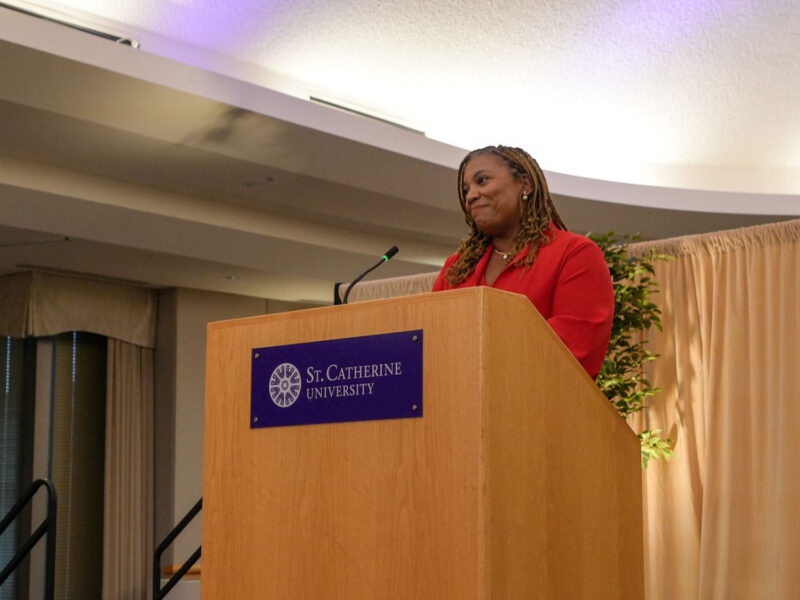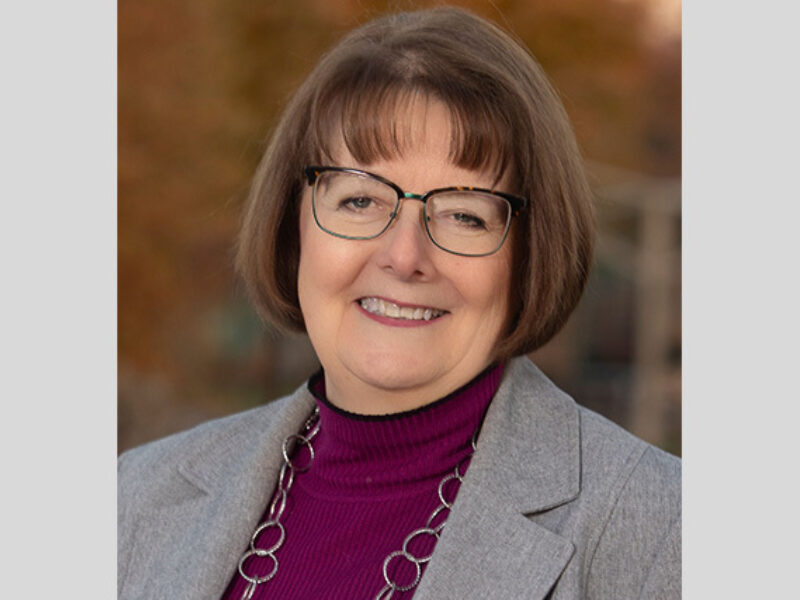Abby Leach Schumaker shares her views on the importance of community foundations and charitable giving in a rural community.

We recently got the chance to speak with Abby Leach Schumaker, owner and solo attorney at Leach Law, PLLC to learn why she partners with the Saint Paul & Minnesota Foundation to help her clients achieve their charitable goals.
How did you learn about the Saint Paul & Minnesota Foundation?
I learned about the Saint Paul & Minnesota Foundation in two ways. I currently serve on quite a few nonprofit boards in town. One of them is the Albert Lea Education Foundation, which has its endowment with the Saint Paul & Minnesota Foundation.
My first experience was on that nonprofit board and learning the ins and outs of how the Foundation manages the funds and the process of creating an endowment. Through that work, I was able to observe how well that worked for the Albert Lea Education Foundation.
The second was through a retired financial advisor, Joe Johnston. He was the chair of the Freeborn County Communities Foundation, which participates in the Foundation’s community affiliate program. They held a seminar about the Foundation and the different planning techniques our clients could use with either the Saint Paul & Minnesota Foundation or the Freeborn County Communities Foundation.
Since then, I've been lucky to work with the Foundation directly.
What made you choose to specialize in the type of law you have?
I grew up in Albert Lea and came back to start my practice here.
When I came back, there was another firm in town that mostly specialized in estate planning, real estate and the business side of things. When those lawyers retired, they did not have a succession plan, so they shut their doors and left the market open.
Being from a rural community, our business is focused on agriculture. Prior to starting my law career, I worked for Pioneer in Johnston. My background is biochemistry, so not a typical law background. It’s helped me to combine the agriculture side of the business with the estate planning and succession planning sides. I found a really good niche working with my clients on transitioning out of business to retirement while working with their estate plan.
Since you deal with agriculture, do you work with farmers to use their non-cash assets, such as grain, corn and farm equipment to support causes they care about?
So a lot of times that depends on how well they plan or how they pass away. We do end up with non-cash assets and a lot of the time they have grain left or big equipment that they didn't sell. If they sell, there's going to be some capital gain or in some cases issues with getting rid of those items creating a tax burden, especially depending on what their estate tax level is.
And so I work with my clients to explore how we might set up some of those non-cash assets to be donated later down the road to reduce the tax burden and allow them to give to causes that matter to them. This tends to come into play more when I see families with no kids to pass their farm down.
What do you love most about what you do?
This is a small town. I know my clients. My clients call me for more things than I should probably know about. They're very open with me and they trust me as a consultant on their business and personal life as much as they do with legal matters. I love having that trust level with my clients.
I also love being able to see my clients succeed. You know when things go well. You also hear when things go bad, but it's really nice to be able to follow up and know that either my estate planning worked or the family was able to transition through a death really easy without any disagreements or expenses.
Why do you think it's important to partner with a community foundation?
I’ve partnered with the Saint Paul & Minnesota Foundation for about four years. What I tell my clients is that most people have an idea of where they want their money to go and what they want it to be used for. By working with a community foundation, it allows them to keep that goal going, even after they’ve passed.
An example that I often share is of people who left substantial funds to a church. They know today who's on the board of the church and that the board is great at fulfilling what they want now, but ten years down the road that board is going to change. Maybe you specified that you want your donation to be used for children and their education, but ten years down the road you might get a board that says, ‘Oh we have a hundred thousand dollars, let's put in new pews.’
Working with a community foundation, I feel like there are checks and balances. They do their due diligence. There's a lot more accountability for using the funds how my clients intended that those funds be used.
Why do you think charitable giving is so important?
I think it all really depends on who the client is. People either have a passion for something and want to make sure that thing continues thriving, or they want to ensure growth, for example, by leaving money from their business to help support small businesses staying in rural communities.
Why do you think it is important for more people in your field to talk to their clients about philanthropy?
I think it's important because as much as I don't like to say this, it's beneficial from a tax planning standpoint. I hope that people leave money for other reasons versus just taxes, but it can be a good way to counterbalance real estate taxes and capital gains and make sure that the money is going toward something they want to support.
Is there a specific way you go about trying to encourage giving without pushing the tax benefit?
Usually when I’m working with a financial advisor, I have a conversation asking if their client is passionate about something or if they are already involved in some sort of giving. I like to have a background about my clients before I meet them.
Like I said, my clients know me and they tend to open up about things, so it's a lot easier for me to say, ‘Joe, you've been really involved in youth basketball your entire life. Is there a goal for you to continue that when you pass away?’
From a farming aspect, things are a little bit different. A lot of the time they have a goal in mind of passing things like their land down to the next generation. If they don’t have family, they want to ensure whoever buys it or leases it keeps the ground the way they cared for it. For those farmers who don’t have a benefactor, that's usually when I throw the tax language in. They tend to care about taxes.
What’s up next for you and your firm?
So right now I'm a solo practitioner. I would love to have another attorney come in who has the same passion as I do. I know in rural communities we need attorneys. If you go over to Faribault County, which is just to the west of us, I think there are four attorneys for that entire county. So I would like to be able to expand and try to branch out to some of those counties that are in need of some assistance.
This interview has been edited for length and clarity.
Abby Leach Schumaker, owner and solo attorney at Leach Law, PLLC, is a member of the Saint Paul & Minnesota Foundation’s Cornerstone Council, an advisory group of professional advisors who help fellow colleagues learn more about the Foundation and assist us in learning how to better serve advisors and their clients in charitable planning.









